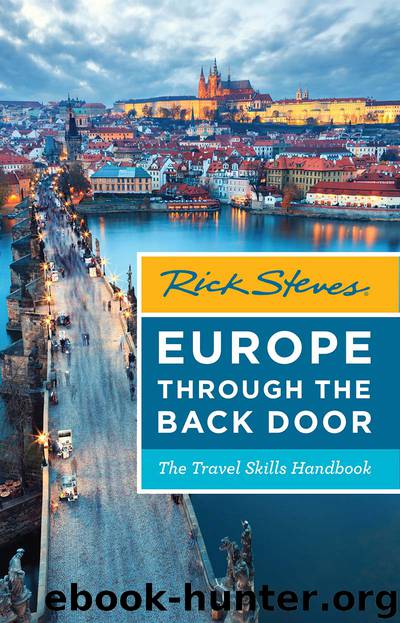Rick Steves Europe Through the Back Door 2018 by Rick Steves

Author:Rick Steves
Language: eng
Format: epub
Publisher: Avalon Travel
Published: 2017-03-17T04:00:00+00:00
Romance Countries (Italy, France, Spain, Portugal): The Romance family evolved from Latin, the language of the Roman Empire (“Romance” comes from “Roman”). Few of us know Latin, but being familiar with any of the modern Romance languages helps with the others. For example, your high school Spanish will help you learn some Italian.
Germanic Countries (British Isles, Germany, Netherlands, Scandinavia): The Germanic languages, though influenced by Latin, are a product of the tribes of northern Europe (including the Angles and Saxons)—people the ancient Romans called “barbarians” because they didn’t speak Latin. German is spoken by all Germans and Austrians, and by most Swiss. The people of Holland and northern Belgium speak Dutch, a close relative to German. While Dutch is not Deutsch, a Hamburger or Frankfurter can almost understand an Amsterdam newspaper. The Norwegians, Danes, and Swedes can read each other’s magazines and enjoy their neighbors’ TV shows.
Slavic Countries (Czech Republic, Poland, Slovakia, Slovenia, Croatia, etc.): Most Eastern European countries (except Hungary, Romania, and the Baltics) speak Slavic languages. While these languages are more or less mutually intelligible, spellings change as you cross borders; for example, Czech hrad, or castle, becomes Croatian grad. Farther east—in Serbia, Russia, Ukraine, Bulgaria, and elsewhere—the language sounds similar, but is written with the Cyrillic alphabet. The Baltic languages, Latvian and Lithuanian, are distantly related to Slavic tongues.
Finno-Ugric Countries (Hungary, Finland, Estonia): Hungarian, Finnish, and Estonian are more closely related to Asian languages than to European ones—likely hinting that the Hungarians, Finns, and Estonians share ancestors from Central Asia.
Multilingual Countries and Regions: Switzerland has four official languages—German, French, Italian, and Romansh (an obscure Romance tongue)—and most Swiss are at least bilingual. Because the region of Alsace, on the French-German border, has been dragged through the mud during several tugs-of-war, most residents speak both languages. Belgium waffles (linguistically), with the southern half (the Walloons) speaking French and the rest speaking Dutch.
Europe’s Underdog Languages: Every year on this planet, a dozen or so languages go extinct. But thanks to Europe’s determination to celebrate diversity, its underdog languages—once endangered—are thriving once more. The Basques, who live where Spain, France, and the Atlantic all touch, speak Euskara—mysteriously unrelated to any other European language. England is surrounded by a “Celtic Crescent.” In Scotland, Ireland, Wales, and Brittany (northwestern France), the old Celtic language survives. Seek out these die-hard remnants in proud gift shops and bookstores, Gaelic pubs, and the Gaeltachts (districts, mostly in western Ireland, where the old culture is preserved by the government).
Download
This site does not store any files on its server. We only index and link to content provided by other sites. Please contact the content providers to delete copyright contents if any and email us, we'll remove relevant links or contents immediately.
Spell It Out by David Crystal(36116)
Underground: A Human History of the Worlds Beneath Our Feet by Will Hunt(12097)
A Year in the Merde by Stephen Clarke(5430)
Venice by Jan Morris(2573)
Claridge's: The Cookbook by Nail Martyn & Erickson Meredith(2404)
My Paris Kitchen: Recipes and Stories by Lebovitz David(2294)
A TIME OF GIFTS by Patrick Leigh Fermor(2206)
The Plantagenets by Dan Jones(2090)
Welcome to the Goddamn Ice Cube by Blair Braverman(2047)
The Finnish Way by Katja Pantzar(2001)
Top 10 Prague (EYEWITNESS TOP 10 TRAVEL GUIDES) by DK(1988)
Bang Poland: How To Make Love With Polish Girls In Poland by Roosh V(1982)
From Russia with Lunch by David Smiedt(1977)
The Isle of Mull by Terry Marsh(1947)
A TIME TO KEEP SILENCE by Patrick Leigh Fermor(1911)
Rick Steves London 2018 by Rick Steves & Gene Openshaw(1869)
Insight Guides Experience Tokyo by Insight Guides(1859)
A Taste of Paris by David Downie(1857)
Merde in Europe by Stephen Clarke(1771)
